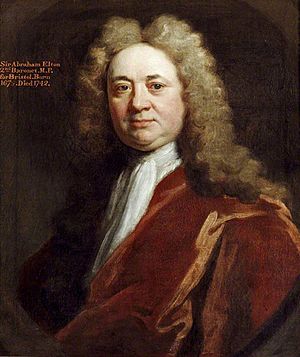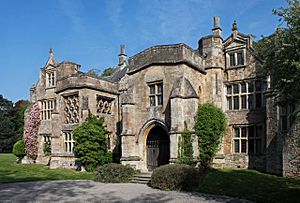Sir Abraham Elton, 2nd Baronet facts for kids
Quick facts for kids
Sir Abraham Elton
|
|
|---|---|

Portrait of Elton
|
|
| Member of Parliament for Taunton |
|
| In office 1724–1727 |
|
| Member of Parliament for Bristol |
|
| In office 1727–1742 |
|
| Personal details | |
| Born | 30 June 1679 (date of baptism) |
| Died | 20 October 1742 (aged 63) |
| Nationality | British |
| Political party | Whigs |
Sir Abraham Elton, 2nd Baronet (born 1679 – died 1742) was an important British businessman and politician. He was a member of the Whig political party. Sir Abraham Elton served in the House of Commons, which is like a parliament. He represented the area of Taunton from 1724 to 1727. After that, he represented Bristol from 1727 until he passed away in 1742. He also held important local jobs in Bristol. He was the High Sheriff of Bristol from 1710 to 1711, and the Mayor of Bristol from 1719 to 1720.
Contents
Early Life and Family
Abraham Elton was the oldest son of Abraham Elton, who later became the first of the Elton baronets. His mother was Mary Jefferies. We don't know his exact birth date, but he was baptised on June 30, 1679.
On May 14, 1702, he married Abigail Bayly. Abigail was the daughter of Zachary Bayly. Her family lived in Charlcot House, Wiltshire, and Northwood Park, Somerset.
Business Career and Challenges
Elton was a successful merchant and industrialist, just like his father. He was the High Sheriff of Bristol from 1710 to 1711. In 1719, he became the Master of the Society of Merchant Venturers, a group of important Bristol merchants. He then served as the Mayor of Bristol from 1719 to 1720.
However, in 1720, he faced financial difficulties during a big economic event called the "South Sea Bubble". He went bankrupt, meaning he couldn't pay his debts. After his term as Mayor ended, he left Bristol and went to France. He only returned when his father helped him by paying off his debts.
Becoming a Member of Parliament
By 1724, Elton was back in England. He decided to run in a special election for Taunton in 1724. He was a Whig candidate and won the election.
One of the other candidates tried to challenge his win, but the challenge was rejected. Elton served Taunton until the general election in 1727. At that time, his father gave up his seat in Bristol. Elton then ran for the Bristol seat. He paid his opponent, a Tory, to withdraw from the election. This allowed Elton to win the seat without anyone running against him.
Work in Parliament
In Parliament, Elton became part of a committee that looked into prisons. He often spoke about business and trade issues. For example, in 1730, he spoke against a company's request to avoid paying for their forts.
He also asked the government to remove taxes on certain goods. He asked for taxes to be removed from soaps and candles in 1730. He also asked five times for taxes to be removed from Irish yarn. He spoke against a new tax law proposed in 1733.
Elton won the election again in 1734. He continued to raise concerns about trade. He was re-elected without opposition in 1741.
Later Life and Legacy
When his father passed away on February 9, 1728, Abraham became Sir Abraham Elton, 2nd Baronet. He also inherited Clevedon Court, a large estate.
Sir Abraham Elton died on October 20, 1742. He had three sons and three daughters. His oldest son became the 3rd Baronet but did not have children. So, the title then went to Abraham's brother, who became Sir (Abraham) Isaac Elton, 4th Baronet. Another of Elton's sons, Jacob, became a captain in the Royal Navy.
 | Aurelia Browder |
 | Nannie Helen Burroughs |
 | Michelle Alexander |


